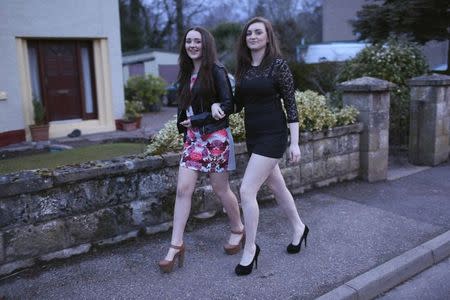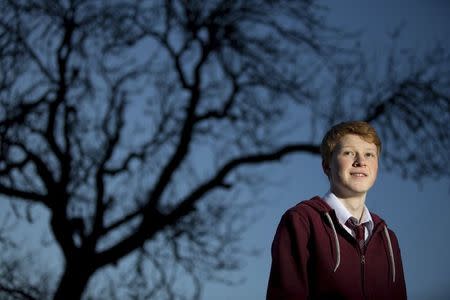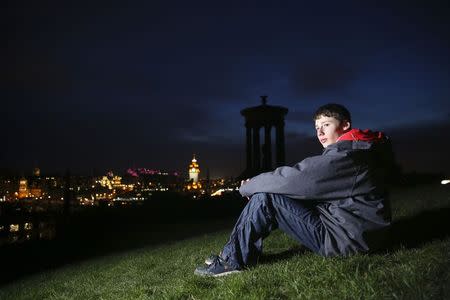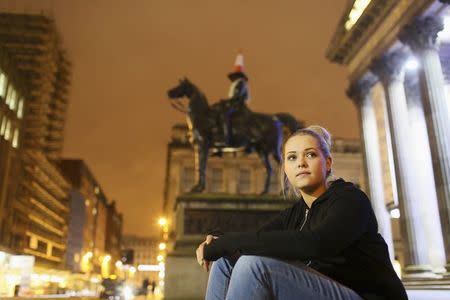Scotland's teenage voters hesitant about independence
By Paul Hackett and Belinda Goldsmith EDINBURGH (Reuters) - When Scotland's nationalist government dropped the voting age to 16 for this year's referendum on independence, it was widely seen as banking on teenage radicalism to ensure a break with the United Kingdom. If so, it may have miscalculated. Two opinion polls and Reuters interviews with 25 Scottish teenagers in 10 different locations suggest the ruling Scottish National Party (SNP) can't be sure of their support in the Sept. 18 referendum. "Whilst I'm proud to be Scottish, I believe we're financially and economically stronger in the larger union," student Charlotte Smith, 16, told Reuters during a break from revision for summer exams. "But I am pleased that the reduced age limit allows me to participate," added Smith, from Dumfries in southwest Scotland, describing the vote as historic. Few polls have asked the 16- and 17-year-olds how they plan to use their one-off chance to vote in the referendum on ending the 307-year-old union with the rest of Britain. Overall, polls show Scots remain doubtful about separation, although the proportion of those supporting independence has increased over the past year. Many are still undecided. In a survey of 1,000 young Scots last May, researchers from Edinburgh University found 60 percent of the 14- to 17-year olds opposed independence with 21 percent in support. A poll of 1,500 older students at Glasgow Caledonian University this year found 63 percent wanted to stay in the United Kingdom. The voting age for UK elections is 18. Only a few countries allow 16-year-olds to vote. RISK AVERSE? Of 25 teenagers questioned by Reuters, 13 planned to vote "No" to independence, nine "Yes", and the rest were undecided. While these 25 interviews cannot give anything like a full picture of Scottish youth views, they do underline that neither side can take Scotland's teenagers for granted. "I'm unsure what would happen with a 'Yes' vote," said Danny Hutcheson, 16, of Fraserburgh, Aberdeenshire, who plays the bagpipes in a local band. He worries about the future currency of an independent Scotland, defence and the division of oil reserves, issues that would need to be negotiated with London between a "Yes" vote and the March 24, 2016 date set for Scottish independence. Political scientist Mark Shephard of Strathclyde University, who has been conducting a social media project on Scottish independence, said this was a common concern among teenagers. "The possibility of market uncertainty over what is going to happen just at the time students are contemplating the job market during a period of prolonged economic difficulties is influencing them," he told Reuters. Figures from the National Records of Scotland this month show teenagers keen to vote. More than 98,000 aged 16 or 17 are already registered for September - about 80 percent of that age group, making up about 3 percent of the 4 million voters. "This level of interest clearly demonstrates that giving the vote to 16- and 17-year-olds is clearly the right thing to do," said SNP deputy leader Nicola Sturgeon in a statement. INDEPENDENCE Sixteen-year-old Megan McKay backed the "Yes" campaign in a debate at her school in Banff, 170 miles (275 km) north of Edinburgh, saying an independent Scotland could make better use of its oil wealth. She was also attracted by promises to get rid of nuclear weapons and keep university education free - in England, tuition costs about 9,000 pounds ($15,000) a year. Independence "will provide better opportunities for young people, including students," McKay told Reuters in a break from surfing in the cold waters off the east coast of Scotland at Macduff in Aberdeenshire. "Scotland ... will become a wealthier nation," she predicted. "It's also influenced me to get more involved in Scottish politics." Mairie McGillivray, 16, a student and Scottish country dancer from Islay in the Inner Hebrides, believes Scotland would be better off culturally if it left the United Kingdom and shares a widely-held view that Britain's voting system does not reflect Scottish views accurately. "I believe that Scotland isn't governed by democratic means due to our lack of representation in Westminster," she said. But Hannah Campbell, also 16, fears an independent Scotland would lose its voice on the world stage and says the country stands to gain more from the European Union if it stays in the United Kingdom. Her family runs a farm in Inverness-shire in the Highlands. "I will vote 'No' as I think that our country is fine the way it is and we don't need such dramatic change," she told Reuters on the farm where she had just helped her father deliver a calf. SCOTTISH YOUTH PUZZLE The intentions of Scotland's 16- and 17 year-olds has puzzled politicians since the British government dropped opposition to the one-off lowering of the voting age. Some assumed they would be more impressionable and more easily persuaded to vote for independence than their elders. Both unionists and secessionists agree a large number of undecided voters means a relatively small group could swing the referendum in a nation where SNP leader Alex Salmond scored a surprise landslide in 2011 Scottish parliamentary elections. Salmond's victory gave him the clout to insist on an independence vote that Prime Minister David Cameron agreed to in 2012. Cameron opposes independence. Social media is a battleground for youth votes. The Yes Scotland campaign has notched up 40,700 Twitter followers and about 150,000 likes on Facebook while the pro-union Better Together has 22,400 Twitter followers and 120,000 Facebook likes. "You will have to look hard to find someone more patriotic than me, and when it all came about a few years ago I was all for independence," said Kieran Green, 16, a student and a keen footballer from Edinburgh. "But growing up and maturing has made me re-think. My heart says 'Yes', but my head says 'No'." ($1 = 0.5977 British Pounds) (Editing by Ruth Pitchford)






